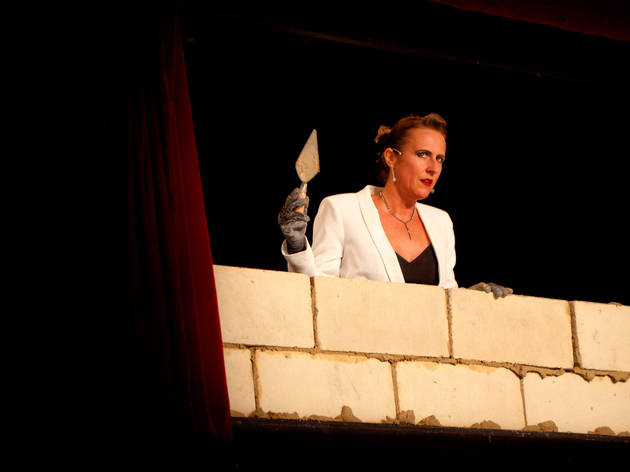She’s not one to do things by halves, so if there’s going to be a stage metaphor, it’s going to be a bloody great big one.
First though, is an introductory preamble, by which Ursula Martinez means to make that important initial impact on an audience, and handover her mobile phone for a selfie to be taken later on. She wants to please us, but we know she is going to be a tease. Her visual impact is immediate: she looks striking in a white trouser suit, an up-do and jewels. Ursula then retreats behind the little proscenium arch theatre on stage and the red curtains open. She pulls on builder’s gloves, wields a trowel, mixes some mortar and starts to work.
She’s going to build, literally build, a wall between herself and the audience. Will it be the performer’s conceptual fourth wall, or more of a Trump-like defensive structure? Words begin to get thrown down with the cement, whip-crack one-liners and observations that range around gender, religion and politics. Is this wall keeping her in, or us out? How the references pile up!
Ursula Martinez has a knack of combining the personal with the universal in a way that continuously surprises. Perhaps it’s the casual crudeness of the language, where a sentence might quite innocently describe ‘taking it up the shitter’.
As the first layer of bricks is laid, Ursula recounts the jolly playground racism of 1970’s singing games and her family’s idiosyncrasies, mimicking her mother’s thick Spanish accent, all the while slathering on the glue, putting the blocks of her life in place.
In her previous show, My Stories, Your Emails Ursula explored the gap between her idea of herself and those projected on to her via social media. Free Admission is similarly vitriolic about such ‘virtual’ abuse. It’s one of the many things that, during the building the second layer of bricks, seriously pisses her off. Another is people who back out of a conversation saying ‘anyhoo’.
The physical building is as fascinating to watch as the script is to hear – it’s a well-paced combination of movement and text. Properly funny too: ‘Sometimes, I’m convinced my ex-wife used to fake not having orgasms.’ There’s a lightness of tone and a joy in the performance that constantly undercuts the harsh truths of a beautifully written, personal story. And yes she does tease, doing a remarkably fine Jamaican accent when she wants to, not when we want to hear it. Mark Whitelaw’s direction keeps the piece flowing and the inevitability of the construct never becomes dull.
There’s a break for Ursula to come out front to share some statistics about the audience demographic, for example how many of us are likely to be gay (an underestimate as it happens – this is Brighton after all). If this section is little less interesting it must give her arms a welcome rest and it provides some close interaction.
As layer four goes up the material darkens, as if by concealing herself from us she is free to reveal more. We’ve heard about her father’s death in hospital, now comes her mother’s escape from the Spanish Civil War as a three-year-old, heavy with the consequences of a non-understood action. The focus here is on women, the things we’re told (‘black is slimming’) and how our voices are silenced, as hers is now being on stage. She has no truck with religion – it too creates barriers and subjugates people.
The wall is erected and her head peeps through a remaining gap. There’s the suggestion of a puppet theatre in this image, emphasised earlier by the disembodied hand of an off-stage assistant re-fixing her battery pack.
Ursula reaches her hand through the gap, offering us an option that echoes her mother’s stark childhood choice. Do we stay secure in the stalls, or do we break through? It wouldn’t be a ‘Red Hanky Lady’ show without a glimpse of the body, so the selfie is a nude one, and an assistant with a video camera follows a delighted Ursula as she leaves the auditorium and then the building, capering naked into the night air, free at last and quite possibly freezing.

